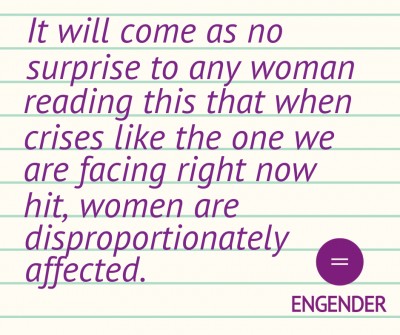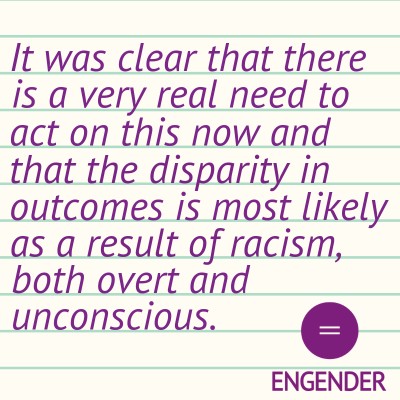Engender blog
All of Engender’s latest news. Reports, reviews, books, articles, and information from across Scotland’s women’s sector.
We would love to hear from other feminists around Scotland. Check out our guidelines for more information on how you can blog for us.
Data matters in our response to Covid-19
As Engender continues to work to ensure that women's equality is at the heart of Scotland's response to Covid-19, our Executive Director, Emma Ritch, writes about why gathering the right data is so important.
-400.png) One
of the ways in which we are trying to understand Covid-19, and respond
to the devastation it has brought to families and communities, is
through numbers. The number of tests administered to populations, the
numbers of people admitted to hospital, and the numbers of deaths
attributable to Covid-19 are reported on rolling news. Readers check the
charts produced by data journalists for signs that incidence of the
virus has peaked. Numbers are studded through reporting on possible
strategies for loosening lockdown while constraining transmission of the
virus.
One
of the ways in which we are trying to understand Covid-19, and respond
to the devastation it has brought to families and communities, is
through numbers. The number of tests administered to populations, the
numbers of people admitted to hospital, and the numbers of deaths
attributable to Covid-19 are reported on rolling news. Readers check the
charts produced by data journalists for signs that incidence of the
virus has peaked. Numbers are studded through reporting on possible
strategies for loosening lockdown while constraining transmission of the
virus.
Covid-19 and women's equality - rolling blog
 With the situation around Covid-19 changing every day, one certainty is that it will have an immediate, long-lasting, and disproportionate impact on women. This rolling blog will be kept updated with our work to keep women's equality at the heart of policy-making during the pandemic.
With the situation around Covid-19 changing every day, one certainty is that it will have an immediate, long-lasting, and disproportionate impact on women. This rolling blog will be kept updated with our work to keep women's equality at the heart of policy-making during the pandemic.
We’ve also created a page on our website which has support numbers, resources, and all of the great writing about women and Covid-19 we’re finding. You can access it here.
-----
COVID-19: why women’s equality must be at the heart of our response

This blog from our Communications and Engagement Manager, Alys Mumford, sets out why we've released a paper on women and COVID-19, and why we must never stop talking about women's equality.
The world is a new and confusing place for many of us. A rollercoaster of changes to work, school and care schedules, getting to grips with online meetings and digital lessons, fear for our friends, families and neighbours.
It will come as no surprise to any woman reading this that when crises like the one we are facing right now hit, women are disproportionately affected. More likely to be in precarious and low-paid work, more likely to shoulder additional caring responsibilities, and more likely to be the one worrying about food shopping, dentist trips, and prescriptions.
Gender Matters in Health: Inequalities in Childbirth
Earlier this month, our Head of Development Catriona Kirkpatrick attended an International Women’s Day event ‘We Need to Talk about Race’, at the Royal College of Obstetricians and Gynaecologists (RCOG) exploring racial inequalities in childbirth in the UK. Here, she writes about the event and how this issue is reflected in Scotland.
A recent report from MBRRACE, Saving Lives, Improving Mothers’ Care, which shows that black women are five times more likely to die in childbirth than white women, was the impetus for the event at the RCOG. The report shows that women with mixed ethnicity are also three times as likely to die in childbirth and Asian women are twice as likely to die in childbirth. To date, no research has been conducted into why this is and the MBRRACE report states ‘At present we don’t have enough information to explain the complex and multiple factors at play. Understanding these disparities needs urgent research and action’.
Downloads
 Engender Briefing: Pension Credit Entitlement Changes
From 15 May 2019, new changes will be introduced which will require couples where one partner has reached state pension age and one has not (‘mixed age couples’) to claim universal credit (UC) instead of Pension Credit.
Engender Briefing: Pension Credit Entitlement Changes
From 15 May 2019, new changes will be introduced which will require couples where one partner has reached state pension age and one has not (‘mixed age couples’) to claim universal credit (UC) instead of Pension Credit.
 Engender Parliamentary Briefing: Condemnation of Misogyny, Racism, Harassment and Sexism
Engender welcomes this Scottish Parliament Debate on Condemnation of Misogyny, Racism, Harassment and Sexism and the opportunity to raise awareness of the ways in which women in Scotland’s inequality contributes to gender-based violence.
Engender Parliamentary Briefing: Condemnation of Misogyny, Racism, Harassment and Sexism
Engender welcomes this Scottish Parliament Debate on Condemnation of Misogyny, Racism, Harassment and Sexism and the opportunity to raise awareness of the ways in which women in Scotland’s inequality contributes to gender-based violence.
 Gender Matters in Social Security: Individual Payments of Universal Credit
A paper calling on the Scottish Government to automatically split payments of Universal Credit between couples, once this power is devolved to the Scottish Parliament.
Gender Matters in Social Security: Individual Payments of Universal Credit
A paper calling on the Scottish Government to automatically split payments of Universal Credit between couples, once this power is devolved to the Scottish Parliament.
 Gender Matters Manifesto: Twenty for 2016
This manifesto sets out measures that, with political will, can be taken over the next parliamentary term in pursuit of these goals.
Gender Matters Manifesto: Twenty for 2016
This manifesto sets out measures that, with political will, can be taken over the next parliamentary term in pursuit of these goals.
 Scottish NGO Briefing for UN Special Rapporteur on Violence Against Women
Joint briefing paper for the UN Rapporteur on Violence Against Women.
Scottish NGO Briefing for UN Special Rapporteur on Violence Against Women
Joint briefing paper for the UN Rapporteur on Violence Against Women.

Newsletter
Sign up to receive our newsletter here:
Sign up to our mailing list
Receive key feminist updates direct to your inbox:
